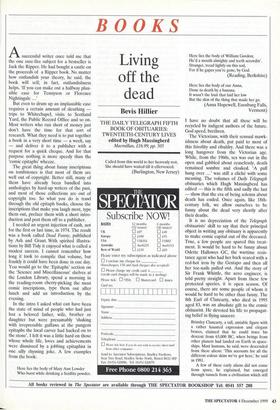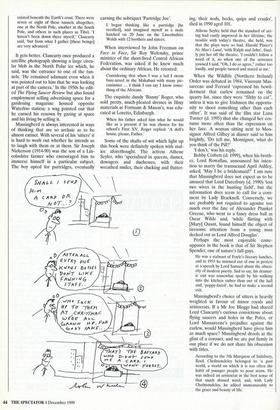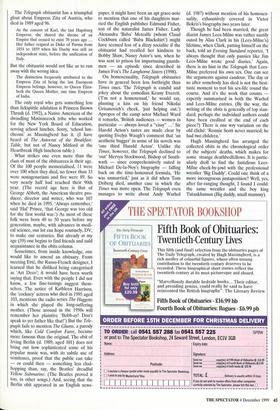BOOKS
Living off the dead
Bevis Hillier
THE DAILY TELEGRAPH FIFTH BOOK OF OBITUARIES: TWENTIETH-CENTURY LIVES edited by Hugh Massingberd Macmillan, 176.99, pp. 505
Asuccessful writer once told me that the one sure-fire subject for a bestseller is Jack the Ripper. He had bought a castle on the proceeds of a Ripper book. No matter how outlandish your theory, he said, the book will sell; in fact, outlandishness helps. 'If you can make out a halfway plau- sible case for Tennyson or Florence Nightingale ...'
But even to drum up an implausible case requires a certain amount of sleuthing trips to Whitechapel, visits to Scotland Yard, the Public Record Office and so on. Most writers who run short of money just don't have the time for that sort of research. What they need is to put together a book in a very short time — a week, say — and deliver it to a publisher with a request for a quick cheque. And for that purpose nothing is more speedy than the `comic epitaphs' wheeze.
The great thing about funny inscriptions on tombstones is that most of them are well out of copyright. Better still, many of them have already been bundled into anthologies by hard-up writers of the past, and most of those collections are out of copyright too. So what you do is trawl through the old epitaph books, choose the inscriptions that make you laugh most, type them out, preface them with a short intro- duction and post them off to a publisher.
I needed an urgent injection of cash, not for the first or last time, in 1974. The result was a book called Dead Funny, published by, Ash and Grant. With spirited illustra- tions by Bill Tidy it enjoyed what is called a modest success. I cannot remember how long it took to compile that volume, but frankly it could have been done in one day. You would go to the 'Epitaphs' section on the 'Science and Miscellaneous' shelves at the London Library, spend a morning in the reading-room cherry-picking the most comic inscriptions, type them out after lunch and add an introduction by the evening.
In the intro I asked what can have been the state of mind of people who had just lost a beloved father, wife, brother or daughter but were presumably 'shaking with irrepressible guffaws at the pungent epitaphs the local carver had hacked on to the stone'. I felt it was a little hard on those whose whole life, loves and achievements were dismissed by a jobbing epitaphist in one silly rhyming joke. A few examples from the book:
Here lies the body of Mary Ann Lowder Who burst while drinking a Seidlitz powder. Called from this world to her heavenly rest, She should have waited till it effervesced.
(Burlington, New Jersey)
Here lies the body of William Gordon; He'd a mouth almighty and teeth accordin'. Stranger, tread lightly on this sod, For if he gapes you're gone, by God.
(Reading, Berkshire)
Here lies the body of our Anna, Done to death by a banana.
It wasn't the fruit that laid her low But the skin of the thing that made her go.
(Anna Hopewell, Enosburg Falls, Vermont) I have no doubt that all these will be recycled by indigent authors of the future. God speed, brethren.
The Victorians, with their sensual mawk- ishness about death, put paid to most of this frivolity and ribaldry. And there was a long hangover from the Victorian age. While, from the 1960s, sex was out in the open and gabbled about ceaselessly, death remained sombre and cloaked. 'A pall hung over ...' was still a cliche with some meaning. The volumes of Daily Telegraph obituaries which Hugh Massingberd has edited — this is the fifth and sadly the last — show that the era of being solemn about death has ended. Once again, like 18th- century folk, we allow ourselves to be funny about the dead very shortly after their deaths.
It is no depreciation of the Telegraph obituarists' skill to say, that their principal object in writing any obituary is apparently to make comic capital out of the deceased. True, a few people are spared this treat- ment. It would be hard to be funny about Odette Hallowes GC, the wartime resis- tance agent who had her back seared with a red-hot iron by the Gestapo and then all her toe-nails pulled out. And the story of Sir Frank Whittle, the aero engineer, is told pretty straight. Apart from these few protected species, it is open season. Of course, there are some people of whom it would be hard to be other than funny. The 8th Earl of Clancarty, who died in 1995 aged 83, was an absolute gift to the comic obituarist. He devoted his life to propagat- ing belief in flying saucers:
Brinsley Clancarty, a tall, amiable figure with a rather haunted expression and elegant braces, claimed that he could trace his descent from 63,000 BC, when beings from other planets had landed on Earth in space- ships. Most humans, he said, were descended from these aliens: 'This accounts for all the different colour skins we've got here,' he said in 1981.
A few of these early aliens did not come from space, he explained, but emerged through tunnels from a civilisation which still existed beneath the Earth's crust. There were seven or eight of these tunnels altogether, one at the North Pole, another at the South Pole, and others in such places as Tibet. 'I haven't been down there myself,' Clancarty said, 'but from what I gather [these beings] are very advanced.'
It gets better. Clancarty once produced a satellite photograph showing a large circu- lar blob in the North Polar ice which, he said, was the entrance to one of the tun- nels. 'He remained adamant even when it was pointed out to him that he was looking at part of the camera.' In the 1950s he edit- ed The Flying Saucer Review but also found employment selling advertising space for a gardening magazine housed opposite Waterloo station; a wag pointed out that he earned his renown by gazing at space and his living by selling it.
Massingberd is always interested in ways of thinking that are so archaic as to be almost extinct. With several of his 'sitters' it is hard to work out whether he intends us to laugh with them or at them. Sir Joseph Nickerson (1914-90) was the son of a Lin- colnshire farmer who encouraged him to immerse himself in a particular subject. The boy opted for partridges, eventually earning the sobriquet 'Partridge Joe'.
I began thinking like a partridge [he recalled], and imagined myself as a male hatched on 20 June on the Lincolnshire Wolds with 12 brothers and sisters.
When interviewed by John Freeman on Face to Face, Sir Roy Welensky, prime minister of the short-lived Central African Federation, was asked if he knew much about the ordinary African. He retorted:
Considering that when I was a lad I swam bare-arsed in the Makabusi with many pic- caninnies ... I think I can say I know some- thing of the Africans.
The exquisite dandy 'Bunny' Roger, who sold pretty, much-pleated dresses in filmy materials at Fortnum & Mason's, was edu- cated at Loretto, Edinburgh.
When his father asked him what he would like as a present if he was chosen for his school's First XV, Roger replied: 'A doll's house, please, Father.'
Some of the shafts of wit which light up this book were definitely spoken with mal- ice aforethought. The actress Athene Seyler, who 'specialised in queens, dames, dowagers and duchesses, with their wreathed smiles, their clucking and flutter-
ing, their nods, becks, quips and cranks', died in 1990 aged 101.
Athene Seyler held that the standard of act- ing had vastly improved in her lifetime; the trouble with today's theatre, she held, was that the plays were so bad. Harold Pinter's No Man's Land, 'with Ralph and John', final- ly put her off the theatre. 'I couldn't follow a word of it, so when one of the actresses yawned I said, "Oh, I do so agree," rather too loudly, and people turned and stared at me.'
When the Wildlife (Northern Ireland) Order was debated in 1984, Viscount Mas- sareene and Ferrard 'expressed his bewil- derment that curlew remained on the quarry list, since they were "filthy to eat", unless it was to give Irishmen the opportu- nity to shoot something other than each other'. It was said of the film star Lana Turner (d. 1995) that she changed her cos- tume more often than the expression on her face. A woman sitting next to Mon- signor Alfred Gilbey at dinner said to him brightly, `Do tell me, Monsignor, what do you think of the Pill?'
'I don't,' was his reply. • Bobby Corbett (d. 1999), when his broth- er, Lord Rowallan, announced his inten- tion to marry the transsexual April Ashley, asked, 'May I be a bridesmaid?' I am sure that Massingberd does not expect us to be amused that Lord Daresbury (d. 1990) 'lost two wives in the hunting field', but the information does seem to call for a com- ment by Lady Bracknell. Conversely, we are probably not required to agonise too much over the fate of Alexander Plunket Greene, who went to a fancy dress ball as Oscar Wilde and, 'while flirting with [Mary] Quant, found himself the object of tiresome attention from a young man decked out as Lord Alfred Douglas'.
Perhaps the most enjoyable come- uppance in the book is that of Sir Stephen Spender, one of nature's fall-guys.
He was a stalwart of Foyle's literary lunches, and in 1955 he stormed out of one in protest at a speech by Lord Samuel about the obscu- rity of modern poetry. Sad to say, his dramat- ic exit was somewhat spoilt by his walking into the kitchen rather than out of the hall and, 'poppy-faced', he had to make a second exit.
Massingberd's choice of sitters is heavily weighted in favour of minor royals and aristocrats. If a Mr Joe Bloggs had shared Lord Clancarty's curious convictions about flying saucers and holes in the Poles, or Lord Massareene's prejudice against the curlew, would Massingberd have given him as much space? Massingberd drools at the glint of a coronet, and we are put firmly in our place if we do not share his obsession with titles.
According to the 5th Marquess of Salisbury, Rock Cholmondeley belonged to 'a past world, a world on which it is too often the habit of younger people to pour scorn. He was indeed an aristocrat in the best sense of that much abused word, and, with Lady Cholmondeley, he added immeasurably to the grace and beauty of life.
The Telegraph obituarist has a triumphal gloat about Empress Zita of Austria, who died in 1989 aged 96.
As the consort of Karl, the last Hapsburg Emperor, she shared the throne of an Empire that ceased to exist 70 years ago ... Her father reigned as Duke of Parma from 1854 to 1859 when his Duchy was still an independent state, before the unification of Italy.
But the obituarist would not like us to run away with the wrong idea.
The distinction frequently attributed to the Empress Zita of being the last European Empress belongs, however, to Queen Eliza- beth the Queen Mother, one time Empress of India.
The only royal who gets something less than lickspittle adulation is Princess Brown Thrush (d. 1992), a Native American of the dwindling Matinnecock tribe who worked for the New York. Board of Education, serving school lunches. Sorry, 'school lun- cheons' as Massingberd has it. (I have heard of The Autocrat of the Breakfast- Table, but not of Nancy Mitford at the Heartbreak High luncheon table.) What strikes one even more than the class of most of the obituarees is their age. Of the 100 people memorialised, 11 were over 100 when they died, no fewer than 33 were nonagenarians and five were 89. So very nearly half had reached their 90th year. (The record age here is that of George Abbott, the American theatre pro- ducer, director and writer, who was 107 when he died in 1995. 'Always remember,' said 'Hal' Prince, 'that George was too old for the first world war.') As most of these folk were born 40 to 50 years before my generation, maybe, with advances in medi- cal science, our lot can hope routinely, DV, to make our centuries. But already at my age (59) one begins to find friends and auld acquaintance in the obits column.
Sometimes, from inside knowledge, one would like to amend an obituary. From meeting Eno, the Russo-French designer, I learned that he disliked being categorised as 'Art Deco': it would have been worth saying that. Even with the people I did not know, a few fine-tunings suggest them- selves. The notice of Kathleen Harrison, the 'cockney' actress who died in 1995 aged 103, mentions the radio series The Huggetts in which she played the long-suffering mother. (Those around in the 1950s will remember her plaintive 'Bobb-ayl Don't speak to yer father like that!') But the Tele- graph fails to mention The Glums, a parody which, like Cold Comfort Farm, became more famous than the original. The obit of Irving Berlin (d. 1989, aged 101) does not bring out how sophisticated some of his popular music was, with its subtle use of semitones, proof that the public can take — or could then — something less clod- hopping than, say, the Beatles' dreadful Yellow Submarine. (The Beatles proved it too, in other songs.) And, seeing that the Berlin obit appeared in an English news-
paper, it might have been an apt grace-note to mention that one of his daughters mar- ried the English publisher Edmund Fisher, son of the naturalist James Fisher. Lady Alexandra 'Baba' Metcalfe (whom Claud Cockburn called 'Baba Blackshirt') might have seemed less of a dizzy socialite if the obituarist had recalled her kindness to Bobby Shaw, Nancy Astor's son, when he was sent to prison for importuning guards- men — an episode since described in James Fox's The Langhorne Sisters (1998).
On homosexuality, Telegraph obituaries have in general been less forthright than Times ones. The Telegraph is candid and jokey about the comedian Kenny Everett. ('I'm not a homosexual,' he would say, planting a kiss on his friend Nikolai Grisanovich's cheek, 'just helping out.') Apropos of the camp actor Michael Ward it remarks, 'British audiences — women in particular — always loved a "cissy" ...' Sir Harold Acton's tastes are made clear by quoting Evelyn Waugh's comment that 'an aesthetic bugger' in some of his novels was 'one third Harold Acton'. Unlike the Times, however, the Telegraph declined to 'out' Mervyn Stockwood, Bishop of South- wark — since comprehensively outed in Michael De-la-Noy's biography — falling back on the time-honoured formula, 'He was unmarried,' just as it did when Tom Driberg died, another case in which the Times was more open. The Telegraph even manages to write about Andy Warhol (d. 1987) without mention of his homosex- uality, exhaustively covered in Victor Bokris's biography two years later.
Though he had been married, the great diarist James Lees-Milne was rather nastily outed by Alan Clark in his (Lees-Milne's) lifetime, when Clark, patting himself on the back, told an Evening Standard reporter, 'I always thought that only pansies like Jim Lees-Milne wrote good diaries.' Again, there is no hint in the Telegraph that Lees- Milne preferred his own sex. One can see the arguments against candour. The day or so after somebody has died is not the best- taste moment to trot his sex-life round the course. And it's the work that counts expertly summarised in both the Warhol and Lees-Milne entries. (By the way, the writing of the obits is generally of top stan- dard; perhaps the individual authors could have been credited at the end of each piece?) There is one wry variation on the old cliche: 'Ronnie Scott never married; he had two children.'
Hugh Massingberd has arranged the collected obits in the chronological order of the subjects' deaths, which makes for some strange deathbedfellows. It is partic- ularly droll to find the fastidious Lees- Milne cheek-by-jowl with the professional wrestler 'Big Daddy'. Could one think of a more incongruous juxtaposition? Well, yes, after far-ranging thought, I found I could: the same wrestler and the boy king Tutankhamun (Big daddy, small mummy).




















































































 Previous page
Previous page